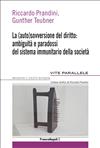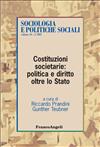
Quando Niklas Luhmann nel 1984 definì il sottosistema sociale del diritto come il sistema immunitario della società, non intendeva usare una metafora. Il diritto, trasformando le contraddizioni che metterebbero in pericolo l’autopoiesi societaria in conflitti regolati da procedure, prima allarma la società comunicando presenza di pericoli, poi attiva anticorpi che rispondono alla sfida. Il volume − che comprende saggi di Gunther Teubner e Riccardo Prandini − prova a dare una lettura unitaria di tale immunologia sociale.
cod. 11970.5


